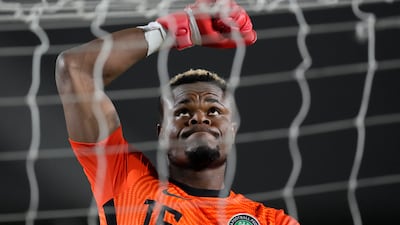In the first week of December, the manager of Nigeria, Jose Peseiro, travelled to the southern tip of Africa. It was high summer in Gqeberha, or Port Elizabeth as it used to be known, with the coastal city looking forward to its tourist season.
Peseiro was there to solve a crisis. Many Nigerians would call it a chronic one: the lack of a reliable, big-match-ready goalkeeper for the national team, a live issue since the 2015 retirement of Vincent Enyeama, a record-breaker and inspiration through over 100 caps.
In Peseiro’s rear-view mirror were high-profile errors that marked the Super Eagles in the period immediately before he was appointed as coach.
There was the long, speculative shot that bounced up off the outstretched arm of keeper Maduka Okoye and into the Nigerian goal in the last 16 of the 2021 Africa Cup of Nations, gifting Tunisia victory. There was the long, speculative drive that slid underneath Francis Uzoho’s body two months later, granting Ghana a place at the Qatar World Cup at Nigeria’s expense.
Peseiro had flown to Gqeberha to meet Stanley Nwabili and watch him wearing the gloves for Chippa United, currently in the lower reaches of South Africa’s Premier League, against Golden Arrows.
No glamour fixture this, and a scouting mission that looked a little offbeat, even desperate, just a month ahead of the Cup of Nations in Ivory Coast for which Peseiro was making his plans. Nwabili, 27, had a single cap to his name, from a friendly two-and-a-half-years earlier, a 4-0 Super Eagles defeat to Mexico.
Peseiro introduced himself to Nwabili and watched him keep a clean sheet against Golden Arrows, a 2-0 victory that interrupted an eight-match sequence of Chippa United games without a win. The coach liked what he saw: an imposingly tall and broad keeper with sharp reflexes. He decided his was a presence he could use at Afcon.
Nwabili’s selection was greeted with surprise in Nigeria. He had faded from the radar having left local club football 18 months ago to move a long way south. The best, exported Nigerian talent tends to go north.
Keepers such as Maduka Okoye, of Serie A’s Udinese, and Francis Uzoho, formerly of Deportivo La Coruna in Spain and now of Omonia in Cyprus, make their living in Europe. So does every outfield member of Nigeria’s Afcon squad.
Making a living at Chippa United, meanwhile, can seem insecure. The club have lurched through a series of financial crises and been supported by local government funds, Gqeberha’s civic leaders believing the city needs a top-flight team.
Chippa United, who moved its franchise there a decade ago, are alone in representing South Africa’s fifth biggest metropolis in the upper division of the national sport. An irony, then, in how the peak moment of Nwabili’s professional life unfolded, a little under two months after Peseiro had gone to appraise him.
On Wednesday night in Bouake, Nigeria, with Nwabili installed as their number one, met South Africa in the Afcon semi-final. It dragged into extra-time after the South Africans equalised Victor Osimhen’s goal through a late penalty, confidently put past Nwabili, to the goalkeeper’s right, by Teboho Mokoena.
It stayed 1-1 after 120 minutes. Penalties meant suddenly that form favoured South Africa. Their captain, Ronwen Williams, after all, had saved four spot-kicks in the shoot-out against Cape Verde that put his team into the last four.
Back in August, when Williams’ club, the serial South African champions, Mamelodi Sundowns had beaten Chippa United in Gqeberha, Nwabili had told Williams he is an inspiration to him.
“It’s weird,” reflected Williams, as the keepers assumed their central roles at the penultimate stage of an Afcon full of high-wire suspense and unlikely heroes. “That he told me that I inspire him. I’m happy I can inspire a fellow professional and he’s been amazing this season.”
Weirder still to reflect that after Nwabili, correct in his anticipation of where Mokena – whose penalty in the 90th minute had gone the opposite way to Nawabili’s dive – and Evidence Makgopa would aim for in the shoot-out, had saved their spot-kicks to put Nigeria through to Sunday’s final, that this was only his sixth competitive international.
The first was on Afcon’s opening match day. In between conceding a goal in the first half of Nigeria’s 1-1 draw with Equatorial Guinea and Mokoena’s late equaliser on Wednesday, he had gone eight-and-a-half hours unbeaten. And through the last two games he had still been feeling the after-effects of an injury that forced him to withdraw from the last 10 minutes of the last-16 win over Cameroon.
But perhaps weirdest of all is that Nwabili, the great barrier to South Africa’s dreams, is a man whose club wages are effectively subsidised by South African taxpayers in the city he calls home.
“I still love South Africa as much as their fans love me,” Nwabili posted after steering Nigeria into Sunday’s showdown with Ivory Coast, as directors of Chippa United made it clear that if their goalkeeper’s excellence at Afcon brings in transfer offers for him, they will listen eagerly. They could use the money.


